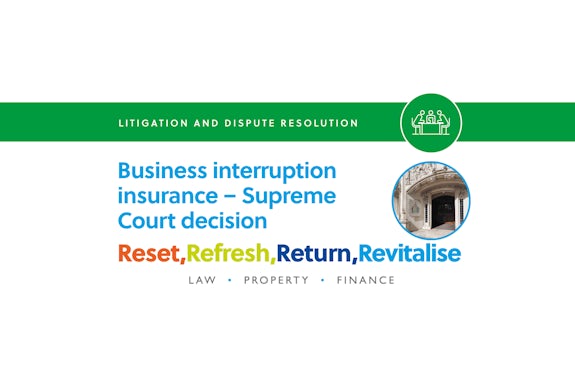
May 2, 2025

In a landmark decision, the Supreme Court published its decision on Friday 15th January 2021 supporting the Financial Conduct Authority (FCA) on all three of the main points in its action raised against insurance companies. This decision affects businesses up and down the country, many completely closed due to Coronavirus restrictions.
The closure throughout the UK of businesses of all kinds has affected over 370,000 operators over the last year. The FCA brought a test case which considered 21 different wordings in business interruption policies against 8 insurers. The wording broadly fell into three categories:
The first decision from the High Court came in September 2020. This found in favour of the FCA in most of the issues, however, that decision was only in relation to specific policy wordings brought before the court. It only related to the policies with 6 insurers involved in the test case. This created a great deal of uncertainty where a policyholder had a policy with another insurer or with slightly different wording.
From the High Court’s decision in September, the 6 insurers involved in the test case appealed to the Supreme Court. Not only did the Supreme Court dismiss those appeals, therefore finding in favour of the FCA and the policy holders it represents, but the court also held insurers should honour the majority of claims brought under the policies.
While claims made are being processed, new claims should be submitted by policy holders as soon as possible. Undoubtedly will take some time for all of the claims to work through the system. The FCA estimates the decision will affect up to 700 types of insurance policies issued by around 60 different insurers. This means thousands of businesses who have been waiting for nearly a year for decisions should now have claims paid out.
If a claim has already been made, brokers and insurers should be contacted now to chase that claim up and see where in the process it is sitting. Additionally, operators should ensure their claim has been acknowledged and they have some correspondence in writing (whether physical mail or email) acknowledging the claim by the insurers. That will give claimants necessary reference numbers and information required to chase up their insurer.
If operators have not made a claim, a claim should now be made as a matter of urgency. There will be timescales in policies for the submission claims and these should be met. Failure to meet timescales in policies can be a reason for insurance companies to refuse claims.
This judgement is a huge relief to all operators affected through the pandemic and provides much-needed support for those areas worst affected. If you are not sure whether your claim falls within the criteria we can advise on this. We can also assist if claims are later restricted, delayed or refused.
If you would like further information on the topic discussed in this blog, please contact Rosie Walker by email: rwalker@gilsongray.co.uk or by phone: 0131 516 5374 / 07841 921 684 or Derek Hamill by email: dhamill@gilsongray.co.uk or by phone: 0141 530 2022 / 07973 924 333. You can also view Rosie’s profile by click here and Derek’s profile by clicking here.
You can also view more information about Litigation and Corporate teams by clicking here.
The information and opinions contained in this blog are for information only. They are not intended to constitute advice and should not be relied upon or considered as a replacement for advice. Before acting on any of the information contained in this blog, please seek specific advice from Gilson Gray.

Rosie specialises in commercial litigation with particular experience in complex, high-value disputes and has been described in The Legal 500 as a 'very experienced first-class litigator’.